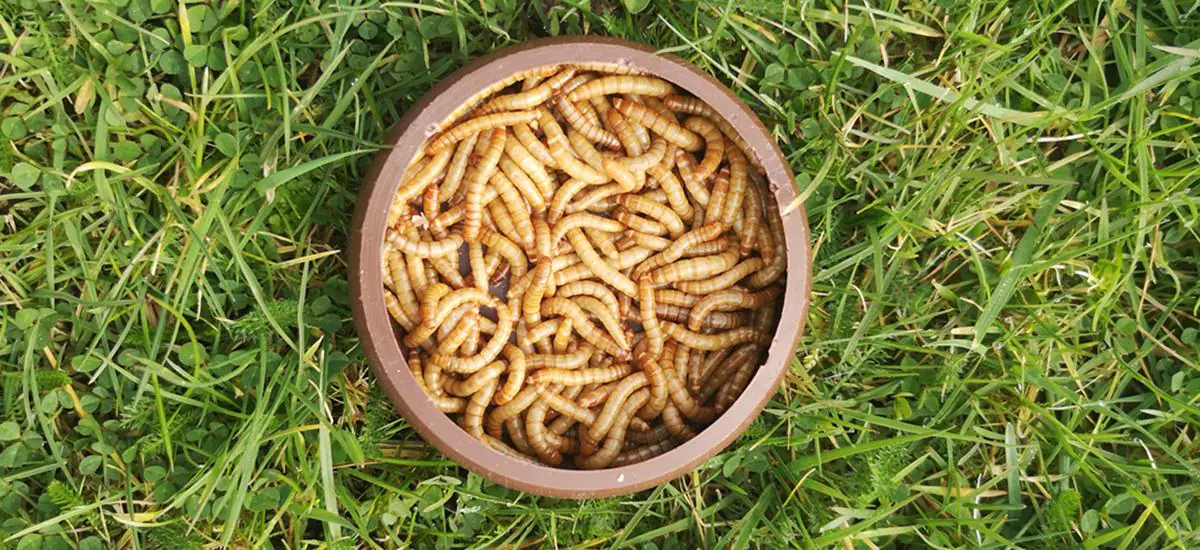Feeding Live Mealworms to Birds
Live Mealworms and Live Waxworms are some of the most popular foods to offer wild birds here in the UK. Not only are they packed with tons of fat, protein and moisture, they also help to keep bird feeding habits as natural as possible.
You may be thinking "why can't the birds just eat wild worms they find?", and whilst it makes sense to think that, there are a few reasons why it's not quite as easy as it sounds. With drastic changes in our UK climate year on year, and the increase in the number of pesticides such as weed killers that we use in our gardens, the number of suitable invertebrates for birds to eat is declining.
Gardening and keeping a well presented garden space is more in fashion than it ever has been and the number of gardens that are now covered in patio, slate and decking is higher than ever. This limits the amount of wild spaces and habitats for bugs that would naturally form part of a birds diet.
With all of this in mind, it's particularly important to offer live worms in the early spring when most species of birds are beginning to mate and the need for high protein food is great.
Feeding live mealworms to your garden birds is easy! We've put together a quick guide with some questions we frequently get asked:
What are Mealworms?
Mealworms are the larvae of the Yellow Mealworm Beetle - the adult beetles are shiny dark-brown or black - their larvae are honey-yellow.
What are Waxworms?
Waxworms are technically caterpillars and are the larvae of the Wax Moth. They are a chubby, white caterpillar with black/brown heads and feet. They have a high fat content and are used to feed a variety of animals including birds and reptiles, as well as being used as fishing bait.
How do I feed live worms to my birds?
Live worms are easy to feed to your garden birds, requiring no specialised feeders or accessories. The easiest way to offer live worms to your birds is to simply put them in a dish or bowl that has high enough sides to prevent the worms crawling out. Waxworms wont tend to crawl too high but mealworms can crawl out of most shallow dishes!
If you already have plenty of birds in your garden and you know your worms won't be around for long, you can simply place your worms on a bird table or in the mesh tray on a feeding station (note: we have found that mealworms can crawl out of the mesh trays on feeding stations if left for too long as you can see from the below picture!)
If you did want to try a feeder, any tray style feeder designed for pellets and worms is suitable, for example the I Love Robins Feeders. These type of feeder also features a dome that keeps the worms dry in wet weather.
How do I keep live worms in my house?
Live worms are relatively low maintenance to keep for short periods of time. Simply store them at room temperature, or slightly cooler, in a ventilated container and in some bran, their food source (our worms are sent in containers with bran). It's important to keep the worms away from an environment that will create condensation in their tubs.
Adding in a fresh slice of veg (like potato) is a good way to offer your worms a drink without putting in water.
Why are live worms good for birds?
Live worms are a brilliant bird food because they encourage the natural feeding behaviour of wild birds and best mimic a natural diet. Both mealworms and waxworms are packed with protein and fat which is vital for birds all year round but especially during the mating and fledgling season in the spring.
Are live worms better for birds than dried worms?
In terms of live foods vs. dried foods, live foods will always have an advantage as they retain their moisture and can offer a natural source of hydration for your birds. Dried worms still retain most of the nutrient value as their live counterparts, but of course without the moisture. So yes, live worms are a better all rounder for birds (though they do come with a higher price tag), however, dried worms and a fresh water source are still a great option.
Ready to try live mealworms and live waxworms in your garden? Visit www.ivelvalleybirdfood.co.uk to shop now.

